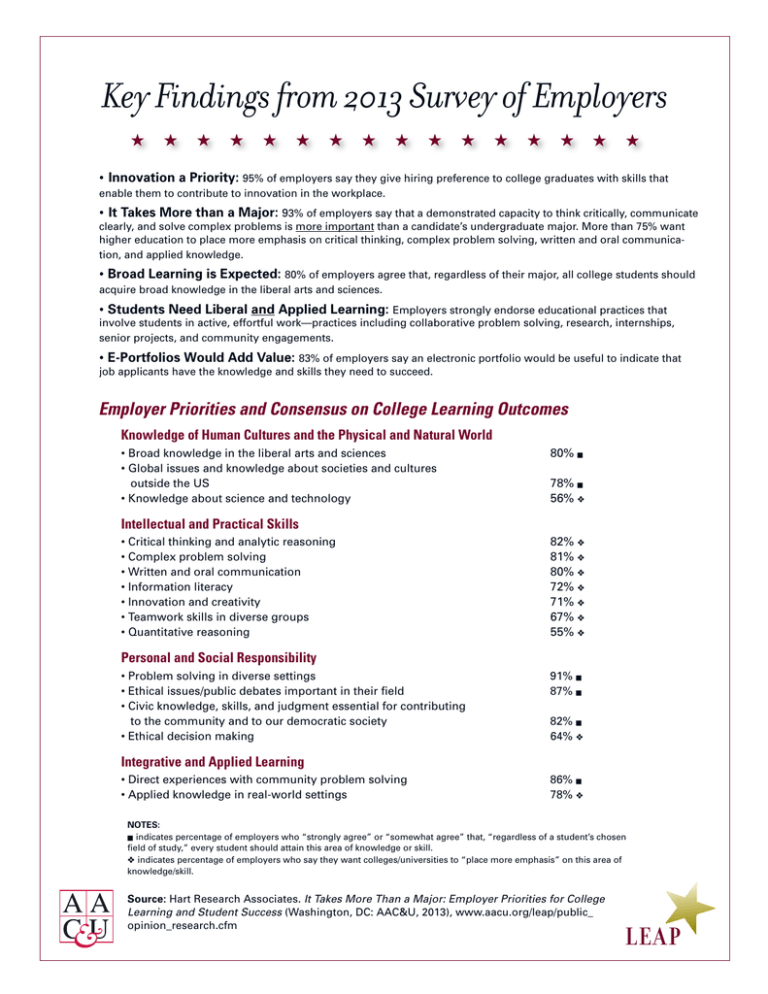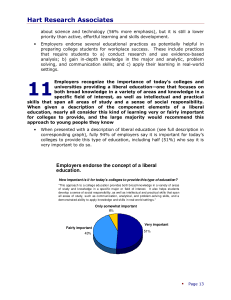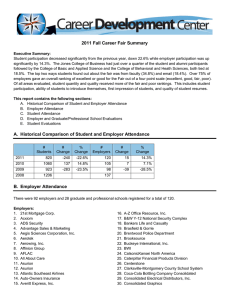Employer Priorities and Consensus on College Learning Outcomes
advertisement

Key Findings from 2013 Survey of Employers • Innovation a Priority: 95% of employers say they give hiring preference to college graduates with skills that enable them to contribute to innovation in the workplace. • It Takes More than a Major: 93% of employers say that a demonstrated capacity to think critically, communicate clearly, and solve complex problems is more important than a candidate’s undergraduate major. More than 75% want higher education to place more emphasis on critical thinking, complex problem solving, written and oral communication, and applied knowledge. • Broad Learning is Expected: 80% of employers agree that, regardless of their major, all college students should acquire broad knowledge in the liberal arts and sciences. • Students Need Liberal and Applied Learning: Employers strongly endorse educational practices that involve students in active, effortful work—practices including collaborative problem solving, research, internships, senior projects, and community engagements. • E-Portfolios Would Add Value: 83% of employers say an electronic portfolio would be useful to indicate that job applicants have the knowledge and skills they need to succeed. Employer Priorities and Consensus on College Learning Outcomes Knowledge of Human Cultures and the Physical and Natural World • Broad knowledge in the liberal arts and sciences • Global issues and knowledge about societies and cultures outside the US • Knowledge about science and technology 80% n 78% n 56% v Intellectual and Practical Skills • Critical thinking and analytic reasoning • Complex problem solving • Written and oral communication • Information literacy • Innovation and creativity • Teamwork skills in diverse groups • Quantitative reasoning 82% v 81% v 80% v 72% v 71% v 67% v 55% v Personal and Social Responsibility • Problem solving in diverse settings • Ethical issues/public debates important in their field • Civic knowledge, skills, and judgment essential for contributing to the community and to our democratic society • Ethical decision making 91% n 87% n 82% n 64% v Integrative and Applied Learning • Direct experiences with community problem solving • Applied knowledge in real-world settings 86% n 78% v NOTES: n indicates percentage of employers who “strongly agree” or “somewhat agree” that, “regardless of a student’s chosen field of study,” every student should attain this area of knowledge or skill. v indicates percentage of employers who say they want colleges/universities to “place more emphasis” on this area of knowledge/skill. Source: Hart Research Associates. It Takes More Than a Major: Employer Priorities for College Learning and Student Success (Washington, DC: AAC&U, 2013), www.aacu.org/leap/public_ opinion_research.cfm




